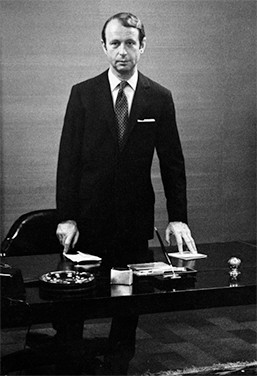
Ludwig “Bill” Frohlich came to the United States in 1931. He had been educated at the University of Frankfurt and in Paris. His specialty was type design and art direction and he applied his talents to pharmaceutical promotion in the US prior to World War II, beginning his own business in 1939. He incorporated his advertising agency in 1943 in time to capitalize on the postwar surge in “miracle drugs.” L.W. Frohlich, Inc. grew rapidly with such clients as Parke-Davis, Schering, Ethicon, Mead Johnson, and Ortho. In the 1950s, his agency took part in the burst of creativity which accompanied the boom in pharmaceuticals, establishing the formats for such tactics as direct mail, detail aids, journal advertising, sampling, educational materials, etc, which we still use today.
As an immigrant, Frohlich brought an international point of view to pharmaceutical advertising and he was the first to set up a network of overseas agencies. Before any competitors, L.W. Frohlich/Intercon opened branches in London, Paris, Frankfurt, Madrid, Milan, and, with foresight, Tokyo.
In addition to pioneering global advertising for pharmaceuticals, Frohlich was instrumental in creating marketing services for the Rx—notably diagnosis/prescribing information. He acquired or founded data-generating companies in the US and in the major pharmaceutical markets, melding them into a unified company, IMS, whose statistics have been basic to pharmaceutical marketing for so many years.
Any description of Bill’s career would be incomplete without reference to his sense of style which saw expression in the furnishings and decoration of the agency’s offices on East 51st Street (New York City), in his Christmas greetings to the industry (usually a small booklet of quotes appropriate to the season, elegantly typeset and beautifully illustrated), and, of course, in the agency’s work. Frohlich gave generously to a number of causes and institutions and the L.W. Frohlich Charitable Trust continues this philanthropy. He was a particularly strong supporter of Dr. Howard Rush and the World Rehabilitation Institute.
Frohlich’s career was cut short by his untimely death in 1971. Stricken by a brain tumor in January, he died in September of that year.